Physical Address
304 North Cardinal St.
Dorchester Center, MA 02124
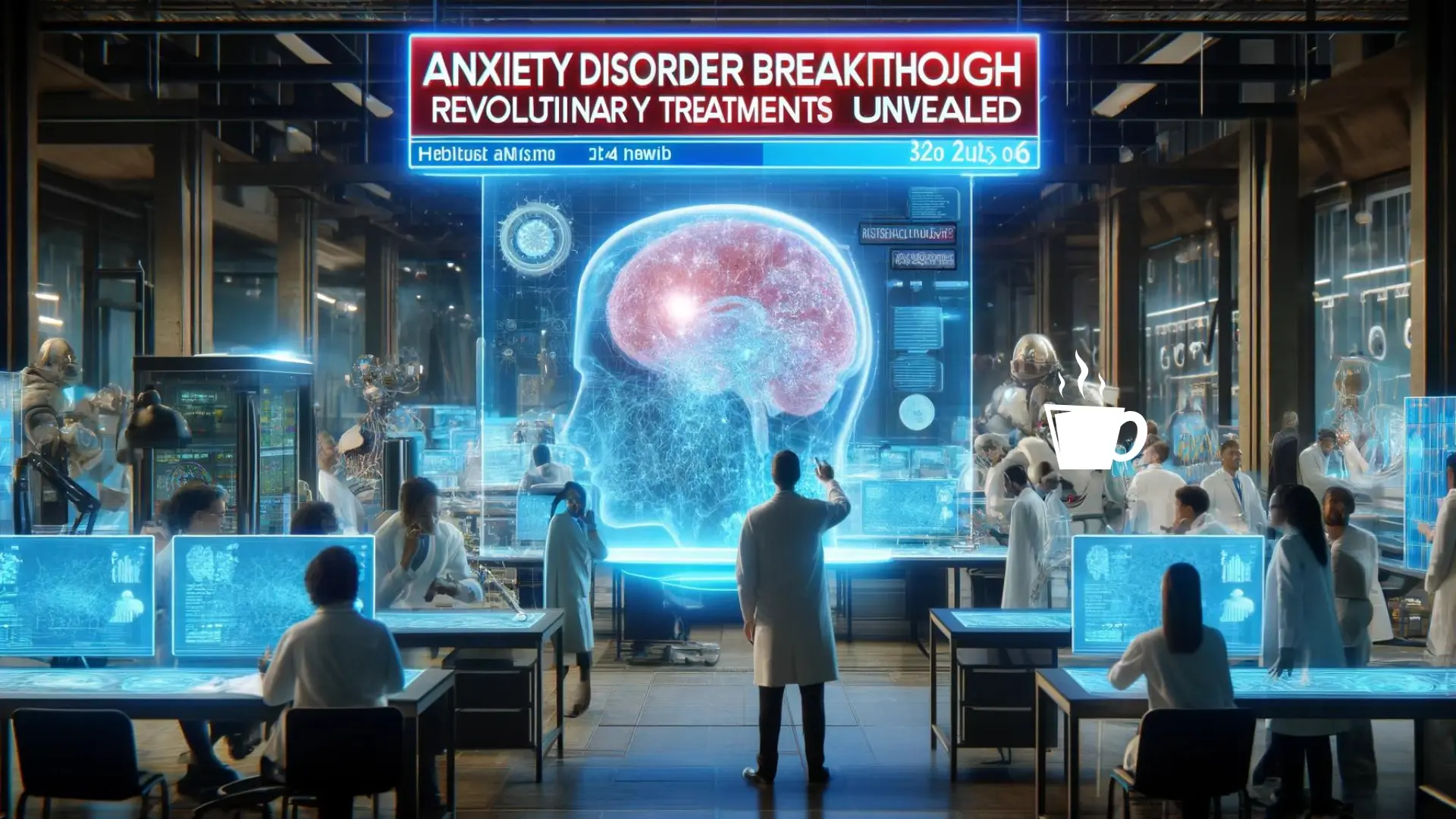
In the labyrinth of modern life, anxiety has become a common adversary, affecting millions worldwide. It’s more than just occasional stress or worry; for many, it’s a relentless presence, casting a long shadow over daily experiences. The quest for effective treatments has never been more urgent, as individuals grapple with the challenges of anxiety disorders, seeking solace and solutions in an ever-changing world.
The unveiling of revolutionary treatments for anxiety disorders marks a beacon of hope for those ensnared by this condition. This article explores groundbreaking approaches that promise not just relief but a potential transformation in the management of anxiety. Through innovative research and technology, we stand on the cusp of a new era, where managing anxiety could become more personalized, effective, and liberating.
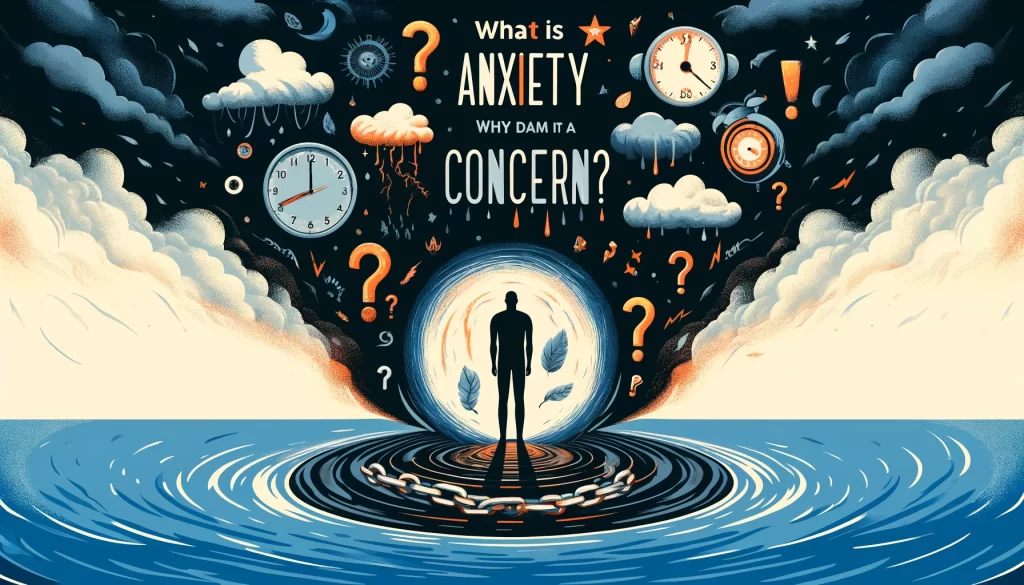
Anxiety, in its essence, is a natural response to stress, a survival mechanism that alerts us to threats and prepares our bodies to react. However, when anxiety becomes persistent, overwhelming, and disproportionate to the actual danger, it crosses into the realm of anxiety disorders. These disorders encompass a broad range of conditions, including generalized anxiety disorder (GAD), panic attacks, social anxiety disorder, and specific phobias. Each manifests uniquely but shares the common thread of excessive, irrational fear and worry.
Generalized Anxiety Disorder (GAD) stands out for its pervasive worry about everyday matters, large and small. This constant state of tension can significantly impair daily functioning and quality of life. On the other hand, panic attacks strike without warning, overwhelming individuals with intense fear and physical symptoms like heart palpitations and shortness of breath, often without a clear trigger. Social anxiety disorder involves a crippling fear of social situations and being judged by others, while specific phobias trigger intense fear about a particular object or situation, from heights to flying.
Understanding the spectrum of anxiety disorders is crucial for recognizing their impact on individuals’ lives. These conditions do more than provoke temporary unease; they can lead to significant distress, hindering personal, social, and professional growth. The pervasive nature of anxiety can affect sleep patterns, concentration, and even physical health, making it a concern that transcends mental well-being.
The prevalence of anxiety disorders highlights the importance of addressing this issue head-on. With millions affected globally, the search for effective treatments is not just a medical challenge but a societal imperative. As we delve deeper into the nuances of anxiety and its disorders, the goal remains clear: to provide those affected with the means to lead fulfilling lives, free from the shadow of anxiety.
This exploration into what constitutes anxiety and its various disorders sets the stage for understanding the critical need for innovative treatments. As we venture into discussions on groundbreaking approaches, it’s essential to keep in mind the diverse experiences of those living with anxiety, underscoring the importance of personalized and effective solutions.
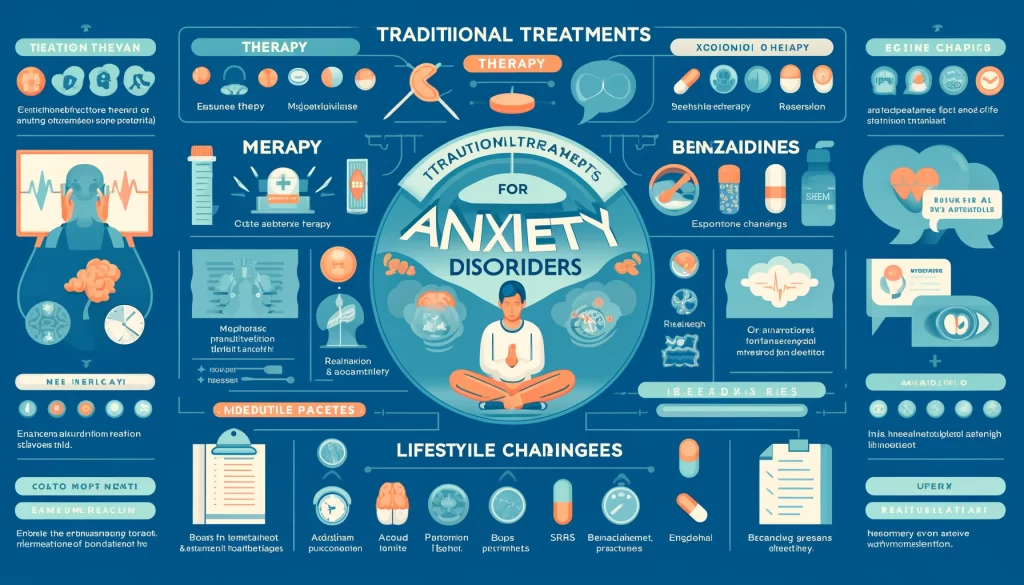
Traditionally, the battle against anxiety disorders has woven through a complex interplay of psychotherapy and medication. Cognitive-Behavioral Therapy (CBT) has stood at the forefront, offering a beacon of hope. This method systematically dismantles the tangled web of negative thought patterns and behaviors exacerbating anxiety, equipping patients with practical tools to navigate the tumultuous waters of their psyche.
Parallel to psychotherapy, medications such as Selective Serotonin Reuptake Inhibitors (SSRIs) and Serotonin-Norepinephrine Reuptake Inhibitors (SNRIs) have played a pivotal role. These substances seek to recalibrate the delicate chemical symphony within the brain, aiming to soothe the relentless surge of anxiety. Yet, this path is not without its hurdles, as side effects ranging from insomnia to diminished sexual desire can cast long shadows, deterring some from embracing these pharmaceutical aides.
The traditional arsenal against anxiety disorders extends beyond the confines of therapy rooms and prescription bottles. Support groups and lifestyle modifications stand as vital complements, fostering a holistic approach to healing. Engaging in regular physical activity, practicing mindfulness, and refining stress management techniques are encouraged, painting a broader stroke in the canvas of treatment options.
Yet, for some, the conventional routes offer limited solace. The nuanced complexities of anxiety disorders mean that what lifts one person may not stir another, highlighting the pressing need for personalized treatment plans. This recognition has spurred a quest for innovation, propelling the medical community toward the horizon of novel therapeutic modalities.
As we venture forth, it’s clear that the journey toward effective anxiety treatment is evolving. Traditional methods lay the groundwork, but the future beckons with the promise of more tailored, dynamic approaches to address the multifaceted nature of anxiety disorders. The dialogue between past treatments and future innovations offers a hopeful narrative for those navigating the stormy seas of anxiety.
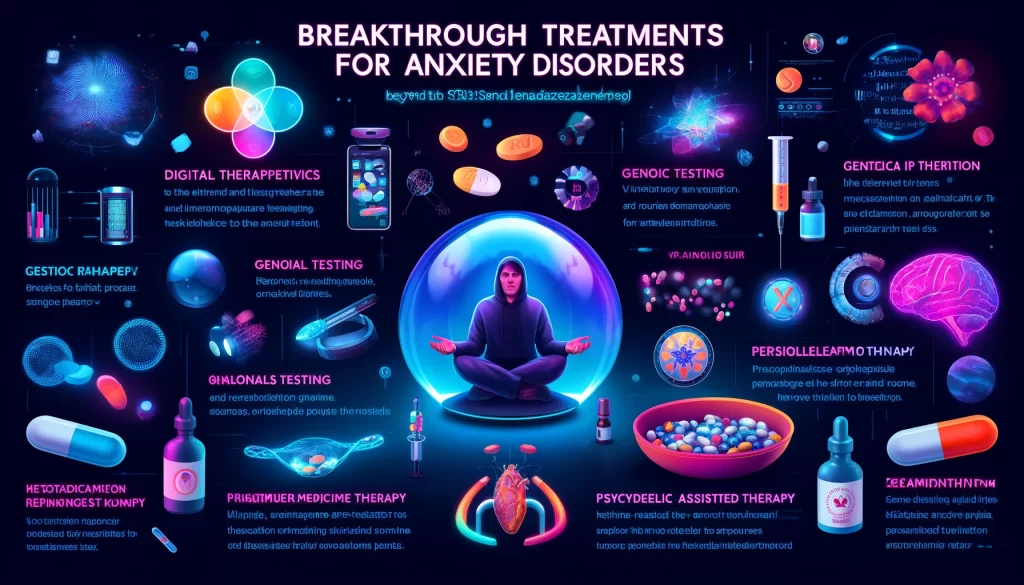
The landscape of anxiety disorder treatments is undergoing a significant transformation, ushering in an era of revolutionary approaches that promise to redefine the therapeutic horizon. At the forefront of this shift are advancements in digital therapeutics, including the use of Virtual Reality (VR) therapy. VR therapy immerses patients in simulated environments designed to trigger and then manage anxiety in a controlled setting, offering a safe space for individuals to confront and learn coping mechanisms for their fears.
Another groundbreaking development is the exploration of psychedelics, such as psilocybin, for therapeutic use. Clinical trials are underway to understand the potential of psychedelics in treating anxiety disorders, with preliminary results showing promise for those who have found little relief in traditional treatments. This approach taps into the brain’s neuroplasticity, potentially resetting the neural circuits that contribute to anxiety.
Personalized medicine, driven by genetic testing, is another frontier being explored. By understanding an individual’s genetic makeup, clinicians can tailor treatments more effectively, choosing medications and therapies that are more likely to yield positive outcomes. This method marks a departure from the one-size-fits-all approach, moving towards care that is as unique as the individual’s DNA.
Technological innovations, such as AI-driven cognitive behavioral therapy apps, offer accessible, immediate support. These tools can provide users with personalized coping strategies, monitoring progress and adjusting approaches in real-time, making therapy more adaptable to the user’s changing needs.
As these novel treatments gain traction, they not only offer new hope to those afflicted by anxiety disorders but also challenge and expand the existing paradigms of mental health care. The promise of these revolutionary treatments lies not just in their novelty, but in their potential to offer more effective, personalized, and compassionate care to those in need.
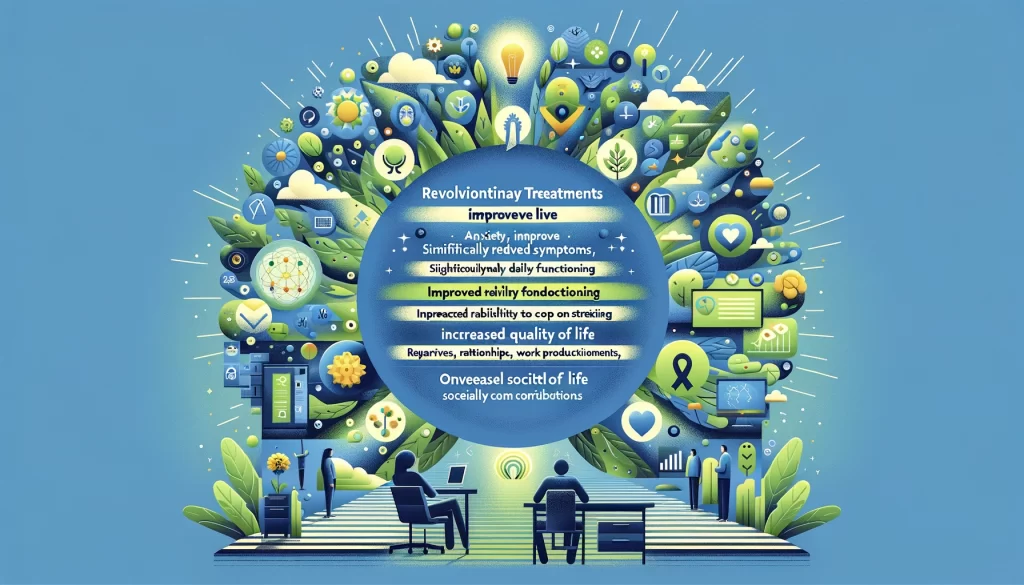
The introduction of revolutionary treatments for anxiety disorders has begun to paint a new landscape of hope for those affected. These innovative approaches, ranging from virtual reality therapy to the controlled use of psychedelics, are not just clinical trials and technological advancements; they are real stories of transformation and newfound hope. The impact of these treatments on individuals’ lives extends beyond the cessation of symptoms; it’s about reclaiming the essence of their existence that anxiety had long overshadowed.
Virtual reality (VR) therapy, for instance, has allowed individuals to face their fears in a safe, controlled environment, gradually reducing their anxiety levels and improving their coping mechanisms. This immersive technology has shown remarkable success in treating specific phobias and social anxiety, enabling users to simulate challenging scenarios and practice their responses, thereby gaining confidence and reducing avoidance behaviors.
The exploration of psychedelics, such as psilocybin, represents another frontier. For some, these substances have facilitated profound psychological insights and emotional processing, leading to significant reductions in anxiety symptoms. Patients describe experiences of connectivity and unity, which, under professional supervision, can lead to breakthroughs in understanding and managing their anxiety.
Personalized medicine, through genetic testing, has tailored treatments to the individual’s genetic makeup, improving the efficacy of pharmacological interventions. This approach not only enhances treatment outcomes but also minimizes adverse effects, making the journey toward wellness more comfortable and sustainable.
Furthermore, AI-driven cognitive behavioral therapy apps offer on-demand support, making mental health care more accessible. These apps adapt to the user’s progress, providing personalized coping strategies and support, thereby fostering a sense of empowerment and agency over one’s mental health.
The transformative impact of these revolutionary treatments on individuals’ lives is a testament to the importance of innovation in healthcare. By offering more effective, personalized, and accessible options, these advancements are not just changing the way we treat anxiety disorders; they’re changing lives, offering a brighter future for those once ensnared by the grip of anxiety.
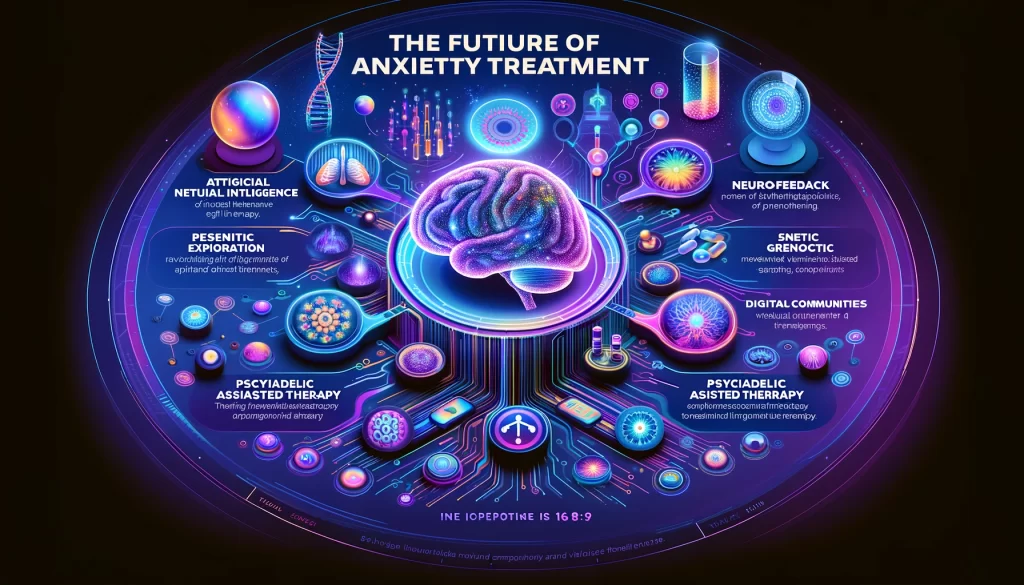
As we stand on the cusp of a new era in the treatment of anxiety disorders, the future holds an array of promising possibilities that could further revolutionize mental health care. The advancements in technology, combined with a deeper understanding of the human mind and its complexities, are paving the way for even more innovative and effective treatments. These future directions not only aim to alleviate symptoms but also to address the root causes of anxiety, offering a more holistic approach to mental wellness.
One of the most anticipated developments is the continued integration of artificial intelligence (AI) in therapy. AI has the potential to provide personalized treatment plans based on vast datasets, analyzing patterns in symptoms and responses to various treatments. This could lead to highly customized therapy sessions, medication regimens, and lifestyle adjustments, all tailored to the individual’s unique needs and circumstances.
Another exciting frontier is the advancement of neurofeedback therapy, where individuals learn to control their brain activity through real-time feedback, often presented in the form of a video game or visual display. This method has shown promise in helping people modulate their own anxiety responses, offering a powerful tool for self-regulation and empowerment.
The exploration of genetic factors in anxiety disorders is also expected to deepen, offering insights into the hereditary aspects of these conditions. This could lead to the development of preventive strategies and targeted therapies that consider an individual’s genetic predisposition to anxiety, ushering in an era of predictive and preventive psychiatry.
Moreover, the potential expansion of psychedelic-assisted therapy, under strict clinical supervision, offers a radical departure from traditional treatment methods. The profound experiences facilitated by psychedelics could help unravel the psychological knots contributing to anxiety, providing lasting relief for many.
Lastly, the rise of virtual communities and digital support networks offers new ways for individuals to connect, share experiences, and find support. These platforms can help demystify mental health issues, reduce stigma, and provide a sense of belonging, which is often crucial for those struggling with anxiety.
As we look to the future, it’s clear that the journey toward understanding and treating anxiety is evolving rapidly. These advancements promise not just to transform treatments but to redefine our relationship with mental health, offering hope and healing to those who navigate the challenges of anxiety disorders.
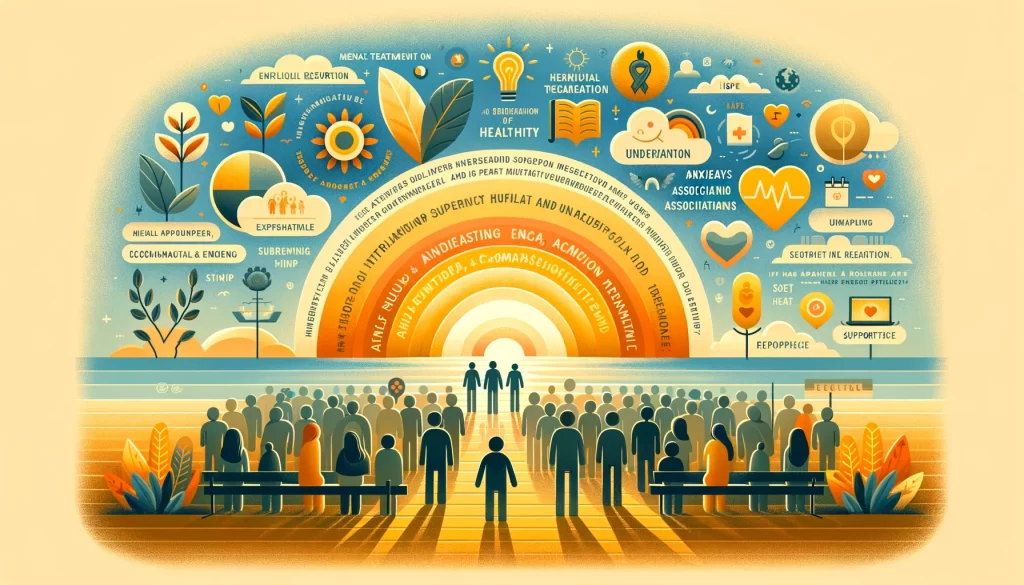
While the advancements in anxiety disorder treatments are promising, it’s crucial to remember that the journey towards mental wellness is profoundly personal and ongoing. The exploration of innovative therapies and the development of new technologies offer a beacon of hope for those navigating the complexities of anxiety. Yet, the foundation of this journey remains rooted in understanding, compassion, and community.
For individuals seeking to deepen their understanding of anxiety disorders or to find support, the Anxiety and Depression Association of America (ADAA) stands as a valuable resource. With a commitment to improving the lives of those affected by anxiety, depression, OCD, PTSD, and co-occurring disorders, the ADAA offers access to the latest research, educational resources, and support networks.
Accessible through [www.adaa.org](http://www.adaa.org), the ADAA’s website is a comprehensive hub for anyone looking for information, support, or ways to get involved in the community. Whether you’re searching for professional help, looking to connect with others who understand your experience, or simply wish to learn more about anxiety and its treatment, the ADAA provides a wide range of resources designed to empower and inform.
As we look to the future, armed with new treatments and a deeper understanding of anxiety disorders, it’s essential to leverage the power of community and information. Engaging with resources like the ADAA can enhance our collective efforts to combat anxiety, fostering a world where mental health is openly discussed, understood, and supported.




